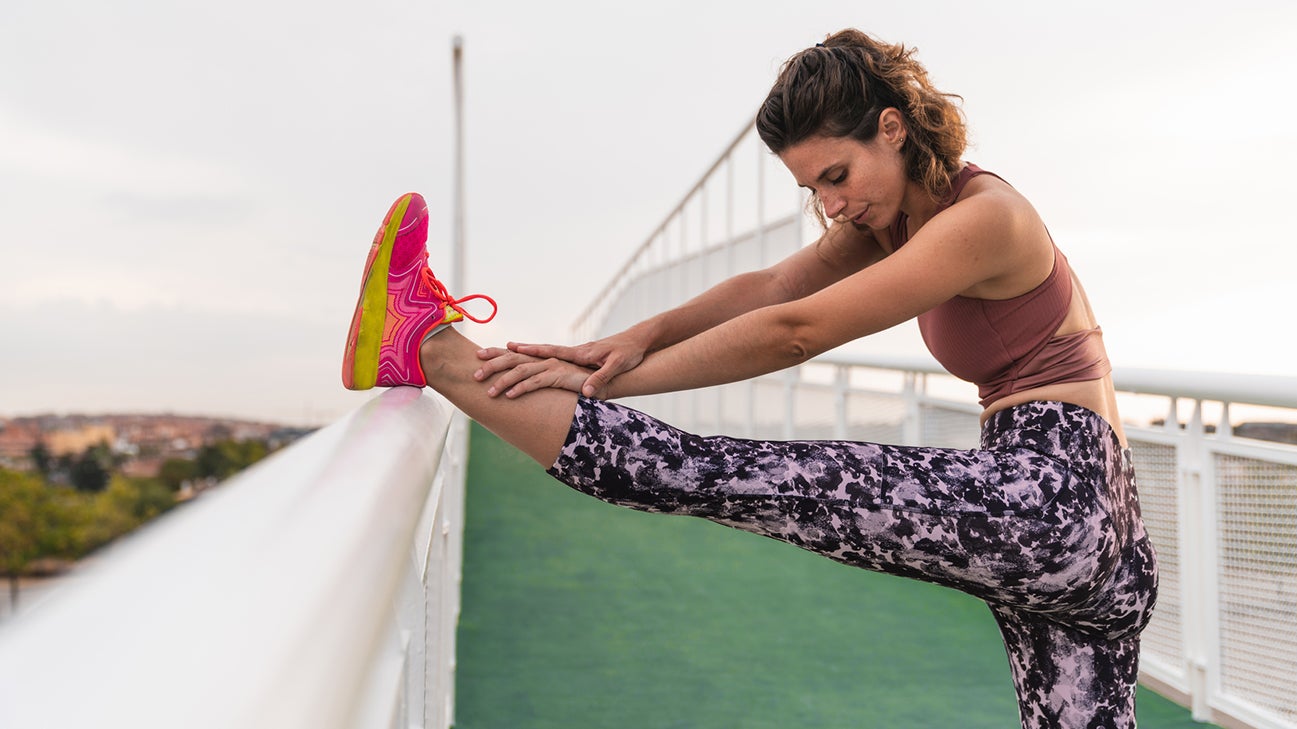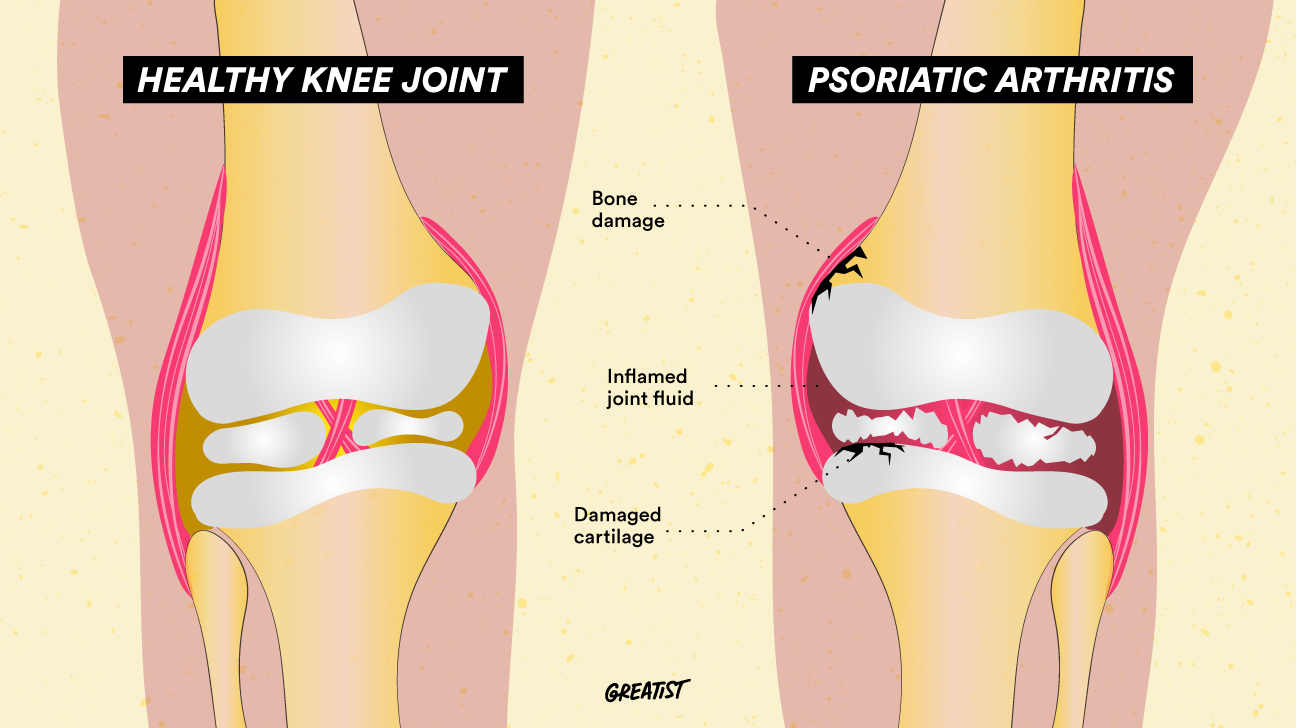With psoriatic arthritis (PsA) you get the unwanted symptoms of both psoriasis and arthritis. So in addition to your skin starring on the “Itchy & Scratchy Show,” you may have stiff joints and tender tendons in your knees.
Here’s what’s going on and how to treat it.
Psoriatic arthritis and your knees
PsA is an inflammatory condition that can cause joint pain, swelling, and stiffness. You may also notice classic psoriasis symptoms like scaling skin plaques and itchy patches.
PsA treatment plans depend on your unique symptoms. Your doctor might suggest topical creams, prescription medications, or physical therapy.

What is psoriatic arthritis?
PsA is a type of inflammatory arthritis. It affects about 30 percent of people who have psoriasis. There are five different types of the condition:
- spondylitis
- arthritis mutilans
- symmetric polyarthritis
- asymmetric oligoarticular
- distal interphalangeal predominant
Joint stiffness, pain, and swelling are common PsA symptoms. The condition can affect any joint in your body, but the knees are a common target. (BTW, you can have PsA symptoms even if you don’t have any classic psoriasis skin issues.)
Symptoms of psoriatic arthritis in the knee
PsA symptoms can range from occasional discomfort to chronic 10/10 pain. If the disease sets up shop in one or both of your knees, you may experience:
- throbbing pain
- limited mobility
- reduced flexibility
- stiffness and swelling
- tenderness, redness, and warmth
- pain when you bend or extend your knee
- a grinding sensation when you bend your knee
- cracking or popping sounds when you bend or extend your knee
A PSA on PsA
PsA doesn’t just affect your joints. It can also cause:
- fatigue
- eye inflammation
- muscle weakness
- swelling of fingers and toes
- back pain and inflammation
- crumbling, pitted, or ridged nails
- tummy troubles like diarrhea, bloating, or constipation
What does it look like? Psoriatic arthritis knee pictures
It can be hard to spot PsA of the knee without an X-ray. You may notice some swelling around your knee or flaky plaques on your skin. These physical symptoms may also show up in your elbows, feet, and hands. But some people don’t have any visible symptoms.
Under the skin, this is what PsA can look like.

What causes psoriatic arthritis?
TBH, we don’t know the exact cause of PsA. According to a 2019 review of research, doctors are still scratching their heads over how the disease progresses.
But there’s a chance genetic factors can increase your risk. Folks who have close relatives with PsA are more likely to develop the condition. Other risk factors may include:
PsA can happen at any age, but most folks first notice symptoms about 10 years after psoriasis skin symptoms show up. Symptoms usually begin between ages 30 and 50.
Can you prevent psoriatic arthritis?
There’s no way to prevent PsA entirely, but you may be able to reduce your chances of a flare-up. Flare-ups can be totally random, but lots of folks notice a pattern.
You might be able to reduce your flare-ups by avoiding common triggers like:
- skin infections
- intense stress or anxiety
- skipping your psoriasis meds
- skin injuries like cuts, scrapes, or burns
- joint injuries such as a sprained wrist, stubbed toe, or twisted ankle
You might also have some luck with an anti-inflammatory diet. Foods that may fight inflammation include:
Treatment options for PsA
There’s currently no cure for PsA, but there are some great treatments that can improve symptoms and slow the disease’s progression. Some popular options include:
- Topical ointments. Topical pain creams and gels can help numb mild discomfort. Just be careful which product you pick — alcohol, fragrance, and sulfates can really mess with psoriasis.
- Physical therapy. A physical therapy regimen can help strengthen your knee. This can help reduce pain and increase mobility.
- Corticosteroid injections. These injections can help reduce swelling and pain.
- Nonsteroidal anti-inflammatory drugs (NSAIDs). Over-the-counter NSAIDs like ibuprofen and acetaminophen can help reduce pain and swelling.
- Disease-modifying antirheumatic drugs (DMARDs). Your doc might prescribe DMARDs if your PsA symptoms are severe. These meds suppress your immune system to help control inflammation.
- Surgery. Joint replacement (aka arthroplasty) might be your best bet if your knee joints are extremely damaged.
How to treat PsA of the knee at home
You can try some of these strategies to help manage your PsA symptoms at home:
- Maintain a solid sleep schedule.
- Take hot baths or use a heating pad to soothe pain.
- Use an ice pack to reduce inflammation.
- Use a knee brace to keep your joint in place.
- Meditate or do breathing exercises to reduce stress.
- Wear comfy shoes that reduce impact on your knees.
- Maintain a healthy weight to reduce stress on your joints.
- Try low impact exercise like swimming, walking, or yoga.
- Use a walker or cane to take some pressure off your knees.
- Avoid high impact activities like dancing, running, and jumping.
FYI: DIY treatments don’t replace legit medical care. Try an at-home remedy only if your doc says it’s OK first.
When to see a doc
You’ll have a better chance at slowing the progression of PsA if you catch it ASAP. Contact a doctor right away if:
- you have a bad psoriasis flare-up
- your knee is warm, swollen, or red
- you have chronic morning stiffness
- you can’t bend or extend your knee
- you have a hard time putting weight on your knee
Bottom line
PsA is an inflammatory condition that affects about 30 percent of people who have psoriasis. It can cause stiff, swollen, and painful joints. When it affects your knees, PsA can reduce your mobility and make it hard to walk or do day-to-day tasks.
While there’s no cure yet, there are some great ways to reduce your risk of a flare-up and manage your symptoms.


0 Commentaires